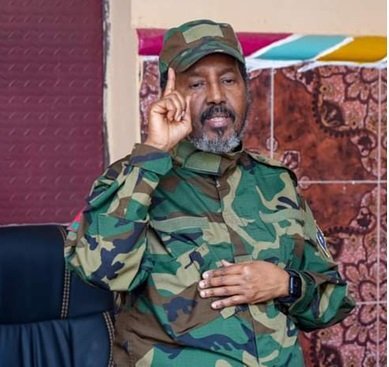By Dayib Sh. Ahmed
The conduct of the current Somali president raises troubling comparisons to that of a warlord. President Hassan has not only failed to build upon the progress made by previous administrations but also neglected to chart a new path to address Somalia’s enduring issues of prolonged conflict, insecurity, and lack of rule of law. Critical steps such as strengthening governance, fostering inclusive political dialogue, implementing a framework for accountability and justice, and conducting comprehensive post-ATMIS security sector reforms are essential to build a stable and prosperous Somalia. Yet, instead of taking on these reforms, his actions reflect an approach reminiscent of past warlords.
An elected leader’s role should fundamentally differ from that of a warlord: a true leader governs through laws, ethics, and a commitment to serve the people, while warlords often rely on force and fear to control. However, with each decision that sidesteps Somalia’s democratic structures, President Hassan’s actions increasingly resemble those of a warlord. Rather than leading through constitutional channels, he seems focused on consolidating personal power, prioritizing control over Somalia’s democratic future. President Hassan’s leadership style, marked by corruption and self-interest, echoes the troubling legacy of warlordism. Having grown up during Siad Barre’s dictatorship and witnessing the chaos under subsequent warlords, he appears to have absorbed and revived some of their methods. Instead of embracing democratic governance, he reconstructs power dynamics similar to those of that dark era, when foreign intervention intensified Somalia’s internal struggles. Recent visits to Kenya on October 23rd and the UAE on November 2nd illustrate this trend. Ostensibly seeking support from Kenyan and Emirati leaders, he seems intent on pressuring regional figures, such as Ahmed Madobe and Said Abdullahi Dani, to support his unilateral decisions. Such maneuvers threaten Somali unity and risk pushing the nation to a breaking point.
Moreover, his recent agreement with Germany regarding the forced return of Somali asylum seekers exposes a cynical agenda. Instead of prioritizing reintegration or meaningful support for returning citizens, this deal appears financially motivated, with funds likely benefiting Villa Somalia’s inner circle rather than those in need. This growing reliance on foreign powers to resolve domestic issues undermines Somalia’s sovereignty and raises serious doubts about the president’s legitimacy. Rather than strengthening the nation, his actions invite further external intervention, worsening Somalia’s internal challenges.

For those who initially think of President Hassan as a learned man, hopes were high that he might draw lessons from Machiavelli’s The Prince. Machiavelli wisely warned rulers against earning the contempt of their citizens, noting that no leader can hold power indefinitely if despised by the people. Yet, to many, the president’s current autocratic tendencies suggest a calculated effort to retain power at any cost. This reality is further reinforced by his repeated undermining of laws meant to uphold democratic order and leadership norms—behavior that not only damages his own legitimacy but also erodes the foundations of the state.
Hassan is not new to this position; he previously served as president between 2012 and 2017. One would expect that his experience in office would guide him toward more effective governance. However, he seems fully aware that his current actions are unlikely to yield positive outcomes. Psychology cautions that repeating the same actions over and over while expecting different results is often considered a hallmark definition of insanity. In lacking foresight and continuing down this path, President Hassan’s approach resembles that of warlords more than an elected leader, undermining Somalia’s progress and democratic values. He is aware that free and fair elections are unlikely to happen in Somalia right now due to the country’s instability, and disregards democratic norms, further consolidating power and deepening the governance crisis.
Somalia at a Crossroads.
Somalia has had an arduous journey of recovery from state collapse. While progress has been made incrementally, each hard-won achievement remains fragile. Currently, this delicate progress is under threat of reversal as the president’s actions risk undoing the stability painstakingly built over the years by previous leaders. If the president persists on this path, he could drag the country back into the chaos that consumed it in 1991. The Somali people, acutely aware of the scare of tyrannical leadership, the scars of civil war and also weary from years of factionalism and corruption under toddling federal system, deserve leadership that genuinely prioritizes the rule of law and is committed to the continuation of the recovery path. Somalis are losing patience, and as Machiavelli astutely observed, no leader can maintain power indefinitely when despised by the populace. While employing fear may produce short-term results, public disdain will ultimately erode any remaining authority, leaving the leader isolated and vulnerable.
Somalia’s fragile state recovery process is now facing critical challenges. The security situation is particularly troubling, with local forces in disarray and unprepared for the poorly timed withdrawal of ATMIS forces. This precarious environment is further exacerbated by worsening economic and financial issues, escalating tensions with Ethiopia over the controversial MoU, and intensifying clan conflicts across the country. These crises, combined with the president’s regressive policies, place Somalia in a dangerous position, heightening the risk of reliving its painful past. Somali scholar and prolific writer, Faisal Abdi Roble, recently shared with me, “As you noted, there are no Somali intelligentsia groups capable of guiding the country away from its perpetual failure and perilous path. It is worrisome to see the vestiges of civil war still suffocating political progress, as we reflect on the current situation unfolding in the country.”
This observation reflects a broader concern: as short-sighted political elites continue to enable foreign interference, public discontent grows, further straining Somalia’s already fragile social fabric. This trajectory underscores the urgent need for a more inclusive approach to governance to prevent the risk of a complete state collapse.
Hard Choice for Somalia’s Future
Somalia stands at a pivotal juncture, with today’s decisions determining whether the nation moves toward stability or risks descending back into turmoil. Unfortunately, President Hassan Sheikh Mahmoud’s leadership in his second term has raised a lot of concerns that align with the worst expectations. Instead of heeding calls for unity and reform, he seems to prioritize personal ambition and the consolidation of power, inconsiderate of Somalia’s fragility. This approach has exacerbated political divisions rather than fostering the national unity he once promised. The Somali people, weary from decades of conflict and factionalism, deserve leaders who respect the rule of law and prioritize the nation’s well-being. However, Hassan’s recent actions suggest he is far from fulfilling the desires of the public or embodying hope and progress that Somalia urgently requires. His apparent disregard for democratic norms could ultimately result in a legacy characterized by division, repression, and further instabilities.
As I noted in my August 20, 2024 article: “One of the most significant failures of Hassan Sheikh Mohamoud’s second term” has been his handling of the relationship between the federal government and regional states. Under his leadership, the federal government has increasingly sought to centralize power in Mogadishu, undermining the autonomy of regional states. This shift toward centralization has led to growing tensions and is seen as a betrayal of the federalism Hassan once championed. By consolidating power in Mogadishu, he has weakened the very system he vowed to protect, creating instability and alienating regional leaders.”
Somalia’s federal system is designed to balance power between the central government and regional states, with constitutionally divided authority allowing each regional state to operate with its own constitution and electoral laws. The federal government does not have the mandate to interfere in state elections or extend presidential terms. Attempts to bypass this structure risk further destabilizing the country, undermining the carefully established framework intended to maintain balance and stability.
Desperate Moves in Dangerous Terrain
With just 18 months left in his term, the president’s chances of changing course are growing slimmer by the day. While some still hope for a shift toward inclusive governance and meaningful national reconciliation, Hassan Sheikh Mohamoud’s track record inspires no confidence. His repeated actions have eroded public trust and weakened democratic principles, suggesting a lack of genuine commitment to the Somali people. As African American poet Maya Angelou wisely observed, “When someone shows you who they are, believe them the first time.” By this standard, Hassan appears more focused on ruling indefinitely, with the backing of his inner circle, rather than addressing the nation’s pressing needs. As his term nears its end, Hassan seems to be growing increasingly dangerous, not only to his own legacy but to Somalia as a whole. Rather than using his remaining time in office to foster unity and address the needs of his people, he appears fixated on extending his power, even if it means disregarding the Provisional Federal Constitution (PFC) entirely.
This desperation to cling to power risks further polarizing the nation, undermining public institutions, and silencing dissent, leading to a fractured Somalia where genuine electoral governance becomes a distant hope. In prioritizing his personal ambitions over national interests, Hassan risks leaving a lasting legacy of division and instability. His leadership has yet to center on the Somali people’s welfare, and his apparent readiness to exploit constitutional limits for self-preservation raises significant concerns about the future of the PFC and governance in Somalia. With the country at a pivotal moment, this focus on self-preservation over service to the nation could have lasting, damaging consequences for Somalia’s stability and any remaining democratic values.
In conclusion, if Somalia is to chart a course toward stability and prosperity, it will require leadership that transcends personal ambition to embrace values of fairness, inclusivity, and justice. Unfortunately, these qualities have been largely absent during Hassan’s tenure. The Somali people, exhausted from decades of conflict, deserve a leader who will strengthen the federal system and uphold the rule of law rather than undermine these institutions for personal gain. As Hassan’s term approaches its conclusion, his legacy risks being defined not by progress toward peace and unity, but by division, repression, and the erosion of democratic principles. The time for effective and principled leadership is now; the Somali people deserve a future where their voices are heard and their rights respected.
Dayib Sh. Ahmed
Email: Dayib0658@gmail.com
—————
Related articles:
Inside the Federal Parliament of Somalia Leadership, Corruption and Scandal: The case of Speaker Adan Mohamed (Madobe)- Part II By Abdullaji Ahmed
Tribalism and Its Challenges to State Formation in Somalia By Dayib Sh Ahmed
A Warlord in Disguise Part I: A Critical Analysis of the Second Term of Hassan Sheikh By Dayib A.
President Hassan Sheikh’s flawed Plan for the 10th National Consultative Council (NCC) is doomed to fail By Abdullahi A Nor
Hassan Sheikh Mohamud: Leader Mired in Moral Decay By Dayib Sh Ahmed


Leave a Reply